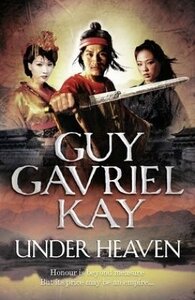Take a photo of a barcode or cover
Well written, but the ending was basically a summary followed by an…
An elegantly well told, and very satisfying book. The story was written in a sort of meandering way, that tied in very well at the end. There were some moments that I found very poignant emotionally, but not heavy handed.
adventurous
emotional
hopeful
inspiring
mysterious
sad
tense
medium-paced
Plot or Character Driven:
Character
Strong character development:
Yes
Loveable characters:
Yes
Diverse cast of characters:
Complicated
Flaws of characters a main focus:
Complicated
I don't read much fantasy, this was a nice change of pace, well written, but didn't hold my interest enough to continue the series.
While slow at some points this was a beautifully written story and surprisingly emotional! Highly recommend for any lover of fantasy and East Asian culture.
As usual Guy Gavriel Kay has written a beuatiful and ocmpelling story. The man weaves magic, creating a wondorous combination of fantasy and history.
adventurous
emotional
hopeful
informative
inspiring
mysterious
reflective
sad
medium-paced
Plot or Character Driven:
A mix
Strong character development:
Complicated
Loveable characters:
Yes
Diverse cast of characters:
Yes
Flaws of characters a main focus:
No
When I sit down to immerse myself in a book, the overall narrative style is important in drawing me into the author's world, but it's generally the sophistication of the overall plot and the strength of the characters that makes me want to stay there. As such, I don't usually wax poetic about the lyrical language of a story, the smoothly coursing flow of words, or the layered beauty of sentences and paragraphs.
Well, this is one of those exceptionally notable exceptions.
Under Heaven is, far and away, the finest work of fiction to come from the pen of Guy Gavriel Kay. It's a book that is perfect in almost every respect, so much so that I was sorry to turn that last page and lay it down, finished. It is definitely a long book, and one best enjoyed at a leisurely pace, but it could have continued on for another five or six hundred pages and I would not have voiced a word of complaint.
In terms of plotting, it's an odd tale, and one that requires a unique sort of patience on behalf of the reader. The story at the forefront of the tale initially seems a little light, given the length of the book, but the story behind that is so deep, so heavily layered, that you don't quite realize precisely how much is going on until Kay shakes us out of our complacency and thrusts us into the final part of the book. Most of the book revolves around Shen Tai, second son to a celebrated general of the imperial army, who has spent the last two years burying bones and laying souls to rest around a mountain lake to honour his father's passing. In honour of his efforts, he finds himself granted a gift of impossible value - 250 Sardian horses - that makes him a major player in the political upheaval that threatens to bring about and end to a dynasty.
Along his journey to the capital in answer to a summons from the Emperor, Tai is targeted by assassins, wooed by rebels, betrayed by his elder brother, loved by his protector, befriended by the generation's greatest poet, and drawn into a game of politics that he's never wanted to play. He is forced to rise above his station, to demand the respect accorded to his honours, and to play a shocking role in the transition of an empire. He is a remarkable character, an admirable young man to whom the reader can almost relate - if only he weren't so spectacularly worthy of the highest esteem.
What makes the story so exquisite is the fact that the characters surrounding Tai are so well developed, they they're worthy of being main characters in their own right. In fact, his sister's magical journey is a story all on its own, escalating a young woman to royalty and shipping her off to a barbarous marriage, only to see her rescued by a man more wolf than man. Wei Song, Kanlin warrior and protector to Tai, is another strong woman, one who is largely responsible for seeing him to his destiny, while Wen Jian, Precious Consort of the Emperor, is a woman as dangerous as she is beautiful, and almost dizzying in her grasp of the game of politics.
Like I said, it's a long story, told at a leisurely pace, and narrated almost exclusively in the present tense. It makes for an unusual read, almost too literate for the genre, but the reader's patience is more than amply rewarded. The subtlety of the telling is exceeded only by the intricacy of the schemes and plots, with a myriad of small events commingling to change the course of history. It's a read that leaves me almost reluctant to read River of Stars, since it's almost unimaginable that an author could manage to capture such lyrical magic twice in a row, but if anybody can do it, it's Kay.
Originally reviewed at Beauty in Ruins
Well, this is one of those exceptionally notable exceptions.
Under Heaven is, far and away, the finest work of fiction to come from the pen of Guy Gavriel Kay. It's a book that is perfect in almost every respect, so much so that I was sorry to turn that last page and lay it down, finished. It is definitely a long book, and one best enjoyed at a leisurely pace, but it could have continued on for another five or six hundred pages and I would not have voiced a word of complaint.
In terms of plotting, it's an odd tale, and one that requires a unique sort of patience on behalf of the reader. The story at the forefront of the tale initially seems a little light, given the length of the book, but the story behind that is so deep, so heavily layered, that you don't quite realize precisely how much is going on until Kay shakes us out of our complacency and thrusts us into the final part of the book. Most of the book revolves around Shen Tai, second son to a celebrated general of the imperial army, who has spent the last two years burying bones and laying souls to rest around a mountain lake to honour his father's passing. In honour of his efforts, he finds himself granted a gift of impossible value - 250 Sardian horses - that makes him a major player in the political upheaval that threatens to bring about and end to a dynasty.
Along his journey to the capital in answer to a summons from the Emperor, Tai is targeted by assassins, wooed by rebels, betrayed by his elder brother, loved by his protector, befriended by the generation's greatest poet, and drawn into a game of politics that he's never wanted to play. He is forced to rise above his station, to demand the respect accorded to his honours, and to play a shocking role in the transition of an empire. He is a remarkable character, an admirable young man to whom the reader can almost relate - if only he weren't so spectacularly worthy of the highest esteem.
What makes the story so exquisite is the fact that the characters surrounding Tai are so well developed, they they're worthy of being main characters in their own right. In fact, his sister's magical journey is a story all on its own, escalating a young woman to royalty and shipping her off to a barbarous marriage, only to see her rescued by a man more wolf than man. Wei Song, Kanlin warrior and protector to Tai, is another strong woman, one who is largely responsible for seeing him to his destiny, while Wen Jian, Precious Consort of the Emperor, is a woman as dangerous as she is beautiful, and almost dizzying in her grasp of the game of politics.
Like I said, it's a long story, told at a leisurely pace, and narrated almost exclusively in the present tense. It makes for an unusual read, almost too literate for the genre, but the reader's patience is more than amply rewarded. The subtlety of the telling is exceeded only by the intricacy of the schemes and plots, with a myriad of small events commingling to change the course of history. It's a read that leaves me almost reluctant to read River of Stars, since it's almost unimaginable that an author could manage to capture such lyrical magic twice in a row, but if anybody can do it, it's Kay.
Originally reviewed at Beauty in Ruins





